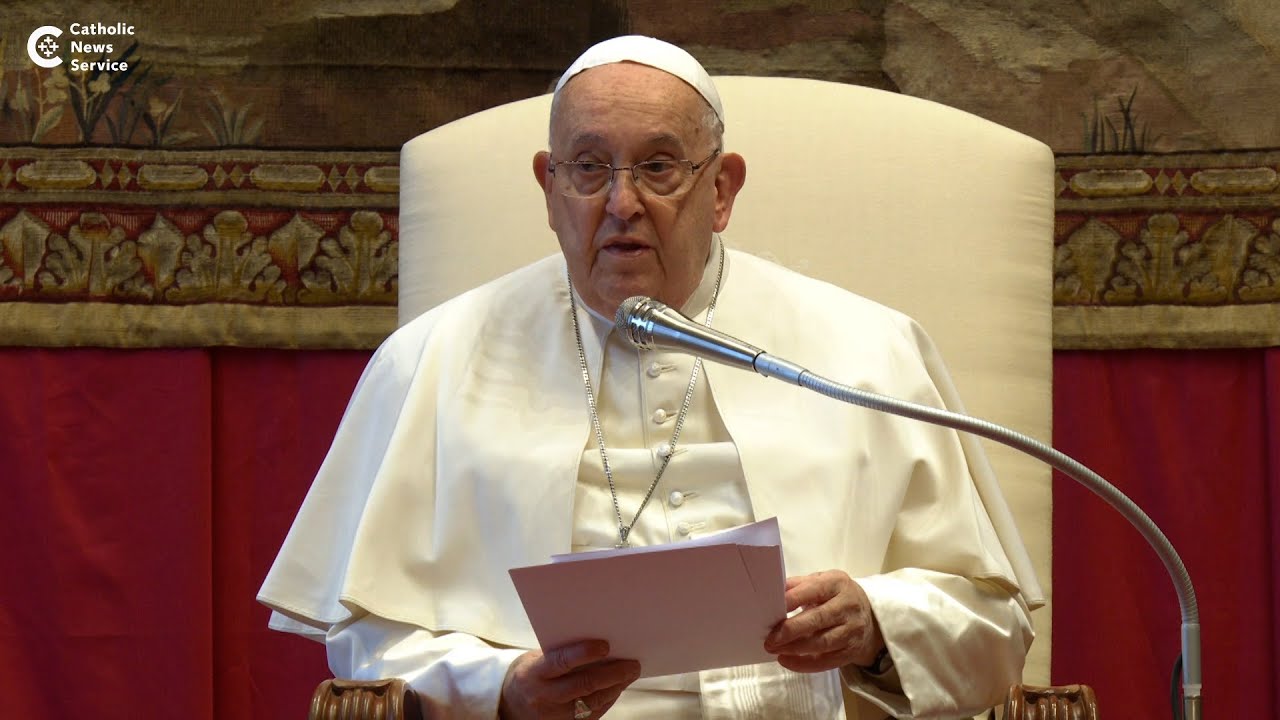Pope to diplomats: Sweep away ‘clouds of war,’ let ‘winds of peace’ blow
VATICAN CITY (CNS) — During the Holy Year 2025, the international community should strive “to overcome the logic of confrontation and embrace instead the logic of encounter,” Pope Francis told ambassadors and other diplomats accredited to the Holy See.
In accordance with the biblical tradition of jubilees, the Holy Year is a time to rediscover how, in God, all people are brothers and sisters, “to pardon offenses, to support the weak and the poor in our midst, to give rest and relief to the earth, to practice justice and to recover hope,” the pope said Jan. 9.
Meeting with representatives of 184 nations, the European Union and the Sovereign Military Order of Malta, Pope Francis read only the first paragraph of his prepared text. Explaining that he was “still suffering from a bit of a cold,” he asked an aide, Msgr. Filippo Ciampanelli, to read the rest of his text.
While the meeting is billed as an opportunity for the pope to wish the diplomats a happy new year, Pope Francis used the occasion almost as a “Jubilee for Ambassadors” by reflecting in his text on the characteristics of “a diplomacy of hope, of which all of us are called to be heralds, so that the dense clouds of war may be swept away by renewed winds of peace.”
Reviewing the past year and challenges the world is facing, the pope’s prepared text offered specific examples, including denouncing “heinous acts of terror, such as those that recently occurred in Magdeburg in Germany and in New Orleans in the United States.”
Warning that growing “social and political tensions” sow increased polarization, distrust, hatred and even violence, the pope referred to attacks in May on Slovak Prime Minister Robert Fico and in July on U.S. President-elect Donald Trump.
In the presence of Andrii Yurash, Ukraine’s ambassador to the Holy See, the pope wrote in his text that “my wish for the year 2025 is that the entire international community will work above all to end the conflict that, for almost three years now, has caused so much bloodshed in war-torn Ukraine and has taken an enormous toll of lives, including those of many civilians.”
“Similarly,” the text said, “I renew my appeal for a ceasefire and the release of the Israeli hostages in Gaza, where there is a very serious and shameful humanitarian situation, and I ask that the Palestinian population receive all the aid it needs.”
Yaron Sideman, Israel’s ambassador to the Holy See, also was present at the meeting and, like all the ambassadors, shook the pope’s hand at the end of the audience.
The Israeli government and various Jewish groups have objected to Pope Francis’ frequent criticism of Israeli military action in Gaza, particularly regarding civilian casualties, the bombing of hospitals and schools and the lack of access for humanitarian aid deliveries.
In his text, Pope Francis said, “My prayerful hope is that Israelis and Palestinians can rebuild the bridges of dialogue and mutual trust, starting with the smallest, so that future generations can live side by side in the two states, in peace and security, and that Jerusalem can be the ‘city of encounter’ where Christians, Jews and Muslims live together in harmony and respect.”
“War is always a failure,” the pope wrote in his text.
In a passage that could refer both to Gaza and to Russia’s war on Ukraine, Pope Francis wrote that “the involvement of civilians, especially children, and the destruction of infrastructures is not only a disaster, but essentially means that between the two sides only evil emerges the winner.”
“We cannot in any way accept the bombing of civilians or the attacking of infrastructures necessary for their survival,” he wrote. “We cannot accept that children are freezing to death because hospitals have been destroyed or a country’s energy network has been hit.”
The Holy Year, the text said, should be a time when the international community takes “active steps to ensure that inviolable human rights are not sacrificed to military needs.”
Pope Francis also expressed concern about ongoing violence or political tensions in Sudan, Congo, Myanmar, Mozambique, Haiti, Bolivia and Colombia.
The speech he prepared also pointed to Nicaragua, “where the Holy See, which is always open to respectful and constructive dialogue, follows with concern the measures taken against individuals and institutions of the church and asks that religious freedom and other fundamental rights be adequately guaranteed to all.”
Under Nicaraguan President Daniel Ortega and his vice president and wife, Rosario Murillo, a handful of bishops and hundreds of priests and other religious leaders have been arrested and expelled from the country, churches are monitored, and church humanitarian organizations have been closed.
